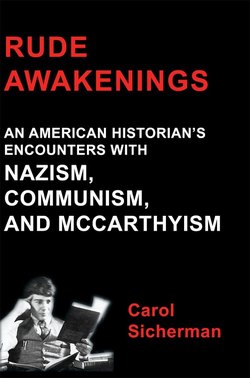Читать книгу Rude Awakenings: An American Historian's Encounter With Nazism, Communism and McCarthyism - Carol Jr. Sicherman - Страница 16
На сайте Литреса книга снята с продажи.
The values of Harry’s social circle
ОглавлениеMost of Harry’s friends were typical German Jews of the educated stratum–students, lawyers, doctors, businessmen, and antiquarians who relished books, classical music, and intellectual debate. In politics, except for the ardent Communists Walter and Betty Elberfeld, they sympathized with the SPD. Political interests extended to the children. The youngest Hirschbach, Franz, recalled playing “Reichstag” as a boy in the early 1930s–performing speeches reported in the Berliner Tageblatt to the “applause and jeering” of his elders.42
Most members of the circle were moderate assimilationists. The Central Union of German Citizens of the Jewish Faith, the largest German Jewish organization, argued (in 1931) that Jews “must place the highest value on humanity as a whole, while at the same time loving the German people and our specific Jewishness.”43 This assimilationist ideal soon proved to be a pipe dream. Stung by the Nazi takeover, the Central Union declared on 23 March 1933: “No body can rob us of our German fatherland…. In that we fight this battle, we carry out a German, not a selfish-Jewish, fight.”44 This was the predominant view of liberal Jews. Peter Gay’s family in Nazi Berlin, for example, thought that “the gangsters who had taken control of the country were not Germany–we were.”45
Individuals in the Gottschalk/Meyer circle varied in their relationship to Judaism. Ernst and Laura Gottschalk kept kosher until World War I made observance difficult, and they did not resume after the war; they sent their sons to religious school and had them bar-mitzvahed, and they observed the Jewish holidays.46 The Freyhans also practiced their religion, to Harry’s disgust, for he had a visceral distaste for any religious observation. Harry described Hans Freyhan as “pretty thick and exceedingly pious, which are doubtless not unconnected,…so god-fearing that when he came home from a holiday recently on a Saturday, he had his brother go to the station for him to carry his suitcase home.”47 Harry’s ignorance left unremarked Hans’s impious willingness to have someone else violate the prohibition against carrying anything on the Sabbath. Ernst Meyer’s sons were bar-mitzvahed, but only because bar mitzvahs were the norm in his circle; he did not object when Rudy declared himself opposed to all religious observance.48 Like Rudy, after his own bar mitzvah Gustav Mayer rejected the Jewish practice in which he had been raised. The Meyers observed Hanukkah in some fashion. When Grete gave Harry a present, she wrote a note: “So that you notice it’s Hanukkah!”49 In 1933, one or two of the younger generation became Zionists. From then on, Zionists and Nazis agreed in one goal: German Jews should move to Israel.
At the far end of the assimilationist spectrum were Rose Hirschbach, her siblings, and her husband, who would have nothing to do with Judaism. Rose and Martin had their four sons baptized Lutheran, and confirmed as well. Rose and Martin wanted their sons to merge totally into “German culture and civilization,” for which Martin had fought in World War I; their Protestant identity “eliminated a major difference between us and our schoolmates.”50 To Hitler, though, “non-Aryan Christians” like the Hirschbachs were Jews.
Despite their mostly casual relation to Judaism, members of the circle had–Harry charged–an “absurd” tendency to view “things from a strictly Jewish center, a sort of Hebraico-Centric theory of the universe.”51 They had company. When, in 1932, the Jewish New Year “happened to coincide with [President Paul von] Hindenburg’s birthday,…all the Berlin Jewish congregations sen[t] hearty congratulations, doubtless not wholly unmindful of the near possibility of having to have Hitler for President.”52 The accelerating tempo of anti-Semitic acts during the year preceding Hitler’s accession to power made the Meyers “apprehensive…. As Herr Meyer one day remarked–‘These are exciting times, would that they were less exciting.’”53 As Chapters 4 and 5 will show, Harry’s friends’ hard-headed realization of the implications of Hitler’s rise to power, coupled with their educational background, saved their lives.
